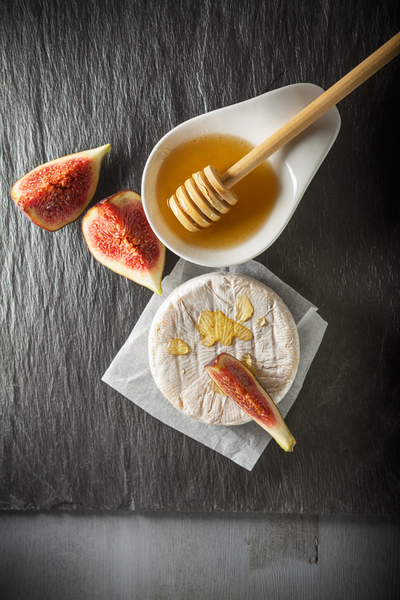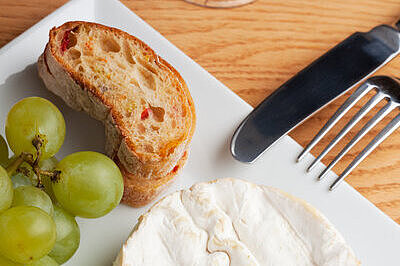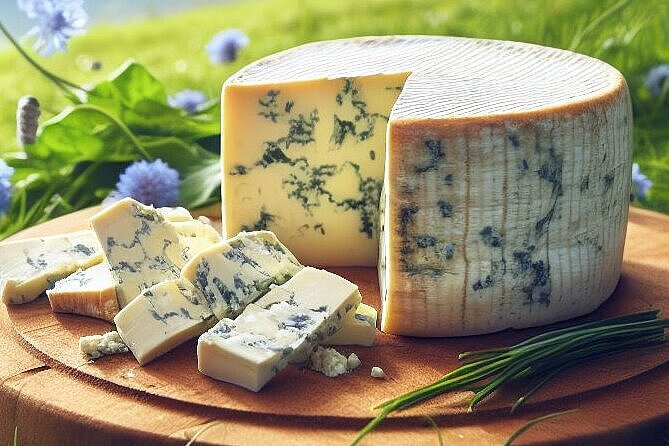Brie

What is Brie?
Brie is a soft cheese from the blue cheese family. It is made from pasteurized or raw cow's milk and mixed with lactic acid bacteria and mould. The mold rind forms during the ripening process and gives the cheese its characteristic taste and smell. Brie has a high fat content of approx. 45 percent in the dry matter and a relatively low lactose content of approx. 2 percent.
Is Brie healthy for dogs?
Brie is not necessarily healthy for dogs, but it is not necessarily harmful either. It depends on the amount, frequency and individual tolerance.
Here are some possible benefits of brie for dogs
- It contains calcium, which is important for your dog's bones and teeth.
- It contains protein, which is important for your dog's muscles and immune system.
- It contains vitamin A, which is important for your dog's eyes and skin.
- It contains vitamin B12, which is important for your dog's nerve function.
Some possible disadvantages of brie for dogs are
- It has a high fat content, which can lead to obesity or digestive problems.
- It has a high salt content, which can lead to high blood pressure or kidney problems.
- It may contain lactose, which can lead to diarrhea or flatulence.
- It may contain mold, which can cause allergic reactions or poisoning.
How much Brie can my dog eat?
If you want to give your dog a small piece of brie as a treat from time to time, there's nothing wrong with that. However, you should make sure that your dog is not allergic or intolerant to dairy products or molds. You should also make sure that your dog does not eat too much Brie. As a rule of thumb, no more than 10 percent of your dog's daily calorie requirement should come from snacks. This means, for example, if your dog weighs 20 kilograms and needs about 800 calories a day, he should not get more than 80 calories from snacks. A piece of brie of about 10 grams has about 40 calories. This means that more than two pieces a day is too much.
How often can my dog have Brie?
Brie should not be a fixed part of your dog's diet. It is a snack that you should only give occasionally as a reward. For example, you can give your dog a piece of Brie when he has learned something new or has been particularly well-behaved. But not daily or several times a day.
Brie is a delicious cheese for humans, but not an ideal food for dogs. If you want to give your dog a small piece as a treat from time to time, you can do so - as long as he doesn't have an allergy or intolerance.
Properties 9
Are you looking for other ingredients with a specific property?
Just click on them to find more.
If you notice any signs of hypersensitivity or poisoning in your dog, you should see your vet immediately. We are not a substitute for a vet, but we try to be as accurate as possible. Every dog reacts differently and we recommend you get a second opinion or consult your vet if in doubt.
Stay healthy and take good care of your four-legged friend!😊
Similar to Brie
Camembert contains a number of nutrients that are important for dogs. These include Protein: Camembert is a good source of protein for dogs, helping to build and maintain muscles, skin, coat and...
Roquefort is a cheese named after the village of Roquefort-sur-Soulzon in the south of France. It has a protected designation of origin, which means that it can only be produced in this region under...
Gorgonzola is a soft cheese with at least 48% fat in dry matter that is produced in the Italian regions of Piedmont and Lombardy. It has a protected designation of origin and may only be produced in...
Bleu d'Auvergne is a cheese made from raw or pasteurized cow's milk, which is mixed with blue mould cultures (Penicillium roqueforti). It is produced in round wheels weighing 2 to 3 kg, which are...



